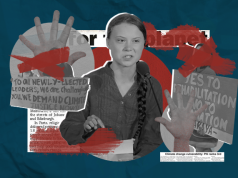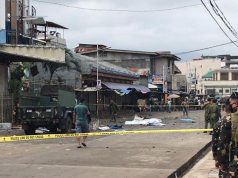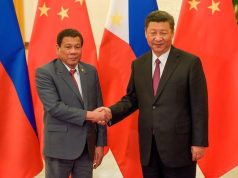MANILA – On Tuesday, July 4, the Supreme Court voted, with one dissent, to uphold the constitutionality of President Duterte’s 60-day martial law proclamation in Mindanao. Senior Associate Justice Carpio was one of three who voted to uphold, but partially–limiting it only to Marawi City.
Here’s how the SC Public Information Office summarized his opinion:
Senior Associate Justice Carpio voted to partially grant the petitions. His vote is reflected in his Dissenting Opinion, as follows:
“ACCORDINGLY, I vote to PARTIALLY GRANT the petitions in G.R. Nos. 231658, 231771, 231774, and DECLARE Proclamation No. 216 UNCONSTITUTIONAL as to geographic areas of Mindanao outside of Marawi City, for failure to comply with Section 18, Article VII of the Constitution. Proclamation No. 216 is valid, effective, and CONSTITUTIONAL only within Marawi City.”
1. Justice Carpio opined that the twin requirements in Article VII, section 18 of actual rebellion or invasion and public safety must both concur before the President, as Commander-in-Chief, may be authorized by the 1987 Constitution to impose martial law or suspend the privilge of the writ of habeas corpus in any part, or in the entirety, of the country. Thus, the Court, in discharging its duty to review the sufficiency of the factual basis for the proclamation and/or suspension, has a two-fold duty: (1) to make a finding of fact that there is or ther is no actual rebellion or invasion, and if there is, (2) to determine whether public safety requires the declaration of martial law or suspension of the privilege of the writ to suppress the rebellion or invasion.
2. His finding is that there is probable cause as to the existence of an actual rebellion and the necessity to the public safety of a proclamation of martial law and the suspension of the privilege of the writ of habeas corpus in Marawi City but not elsewhere. This finding is based on Proclamation No. 216 and the President’s Report to Congress which show clearly that the actual rebellion is confined to Marawi City only.
3. The capacity to rebel, absent an actual rebellion or invasion, is not a ground to declare martial law or suspend the privilege of the writ of habeas corpus under the Constitution. The fear that the rebellion in Marawi City would spread to other areas in Mindanao cannot justify martial law outside of Marawi City as “imminent danger” of rebellion, as a ground for declaration of martial law, no longer exists, having been removed from the 1987 Constitution. Allowing martial law or the suspension of the privilege of the writ of habeas corpus in the rest of Mindanao where there is no actual rebellion is a gross violation of the clear letter and intent of the 1987 Constitution.
4. Ending his dissent, Justice Carpio noted the significance of the President’s own words, thus:
“Immediately after issuing Proclamation No. 216, President Duterte announced to the entire nation and to the world that his martial law “will not be any different from what Marcos did.” The Court must take this public and official statement seriously for this is no trivial matter. When President Ferdinand Marcos declared martial law in 1972 under the 1973 Constitution, he abolished Congress, shut down media, imprisoned leaders of the political opposition, packed the Supreme Court with his law school classmates and loyalists, and ruled by decree—thereby making himself a dictator for over 13 years until the people ousted him from power in 1986. The 1987 Constitution was written precisely to prevent a recurrence of the martial law of Marcos. It is apparent that President Duterte does not understand, or refuses to understand, this fundamental principle that forms the bedrock of our democracy under the 1987 Constitution, despite his having taken a solemn oath of office to ‘preserve and defend the 1987 Constitution.’
The Court cannot simply gloss over this Presidential mindset that has been publicly broadcasted to the nation and to the world. Any sign of acquiescence by the Court to this Presidential mindset would be fatal to the survival of the 1987 Constitution and our democracy. The Court cannot play with the fire of martial law which could turn into ashes the very Constitution that members of the Court are sworn to preserve and defend, a tragic event that once befell the Court in 1972 and brought the Court to its lowest point in its entire history. The Court must never allow the 1972 debacle to be repeated again. With this wisdom from hindsight, the Court must now stand firm and apply the clear letter and intent of the 1987 Constitution without fear or favor, for the nation and history demand no less from every member of the Court.
The decision of the Court in the present petitions has far reaching ramifications on the future of our civil liberties and our democratic society under the rule of law. For in deciding the present petitions, the Court prescribes the fundamental rules governing the exercise of the Commander-in-Chief powers under the 1987 Constitution not only for the incumbent President but also for all future Presidents. The Court should not mercilessly inflict on the Filipino people the constant fear of a recurrence of the nightmarish martial law of Marcos.”
Below, full text of his opinion:









